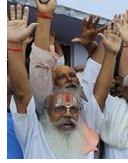A step forward
Disputed India holy site to be divided, court rules
 An Indian court ruled Thursday that a disputed holy site that sparked bloody riots in the past should now be divided between the Hindu and Muslim communities.
An Indian court ruled Thursday that a disputed holy site that sparked bloody riots in the past should now be divided between the Hindu and Muslim communities.
But in its compromise ruling, the court gave Hindus control over the area where the now-demolished Babri Mosque stood — and where a makeshift tent-shrine to the Hindu god Rama now rests.
While both Muslim and Hindu lawyers vowed to appeal, immediate reaction to the ruling was muted and it seemed unlikely to spark violence, as the government had feared.
Hindus rushed to give thanks at temples in Ayodhya, where the atmosphere was peaceful.
"It is very clear the case will go to the Supreme Court. It is not our final victory," said Nitya Gopal Das, president of a Hindu trust involved in the suit.
In Lucknow, where the decision was read, shops were closed, streets were deserted and police were on patrol. And in Mumbai — a flash point for previous Hindu-Muslim violence over the temple dispute — Hindu and Muslim groups appealed for peace.
"We hope all problems regarding matters with Hindus and Muslims can be settled in this amicable way," said Haji Arfat, a leader of the Hindu fundamentalist Maharashtra Navnirman Sena.
The verdict was seen by some as an opportunity for communal reconciliation in India, which many say has moved on from the past with a younger generation more interested in their education and cell phones than communal divisions.
The chief minister of Gujarat state, which has seen some of India's worst religious riots, welcomed the ruling as clearing the path for building the Rama temple.
"The judgment will also act as a catalytic agent in strengthening the country's unity," said Narendra Modi, who was Gujarat's chief minister in 2002 when Hindu mobs rampaged through Muslim neighborhoods in riots that left about 1,000 people dead, most of them Muslims. Those riots were triggered by a fire that killed 60 passengers on a train packed with Hindu pilgrims. The cause of the blaze was unclear, but Hindu extremists blamed Muslims.
The conflict over the 64-acre (25-hectare) compound in Ayodhya — 350 miles (550 kilometers) east of New Delhi — also sparked deadly violence between Hindus and Muslims that has challenged India's ethos as a secular, multicultural democracy.
Some 2,000 people were killed in 1992 when Hindu hard-liners razed the Babri Mosque built on the site in 1528 by the Mughal emperor Babur.
Hindus say the site is the birthplace of Rama, and that a temple to the god once stood there before the mosque.
They want to build a new, enormous temple to Rama, while the Muslims want to rebuild the mosque.
The ruling Thursday would almost certainly force both groups to scale down those plans.
The Allahabad High Court ruling said the site should be shared, with the Muslim community getting control of one-third and two Hindu groups splitting the remainder, including where the mosque once stood.
Archaeological evidence, the court said, showed that a temple predated the mosque.
"The majority ruled that the location of the makeshift temple is the birthplace of Rama, and this spot cannot be shifted," said Ravi Shankar Prasad, a lawyer for one of the Hindu groups who sued.
The court said the site should retain its current status for the next three months to allow for the land to be peacefully measured and divided.
Zaffaryab Jilani, a lawyer for the Muslim community, said he would appeal the verdict, which could delay a final decision in the 60-year-old case for years.
"It's not a victory or defeat for any party. It's a step forward. We hope this matter will be resolved," he said, though he also said he was "partly disappointed."
H.S. Jain, one of the Hindu plaintiffs, said he also would appeal. "100 percent of the land belongs to Hindus. Why split it?" he said.
Mohan Bhagwat, the chief of the Hindu nationalist Rashtriya Swayamsevak Sangh, which was implicated in the 1992 destruction of the mosque, said the ruling should clear the way for construction of the Rama temple.
"I will appeal to Muslims to forget the past. We have got an opportunity to act together," he said.
The government, leaving nothing to chance, had urged peace in the wake of the verdict but still flooded the streets with troops in the state of Uttar Pradesh, where Ayodhya is located. Police arrested more than 10,000 people to prevent them from inciting violence, while another 100,000 had to sign affidavits saying they would not cause trouble, top state official Shashank Shekhar Singh said.
Helicopters hovered over holy sites in the state, as people entering temples were checked with metal detectors, police said.
Prime Minister Manmohan Singh appealed for calm, as the government extended its ban on bulk texting to stop people from sending mass cell phone messages that could incite violence.
More than 40,000 police fanned out across Mumbai, which had erupted in anti-Muslim riots and retaliatory bombings after the Babri Mosque demolition, but played host to scattered peace marches in recent days. Still, many schools were closed Thursday and many businesses planned to close early.
In Hyderabad, capital of the southern Andhra Pradesh state, authorities deployed more than 20,000 additional police. Some 460 arrests to stop possible violence were made, said police chief Abdul K. Khan.
Orders were posted banning the gathering of more than five people in the city, and liquor shops were closed and religious processions and meetings barred, Khan said.
(Published by NY Times - September 30, 2010)